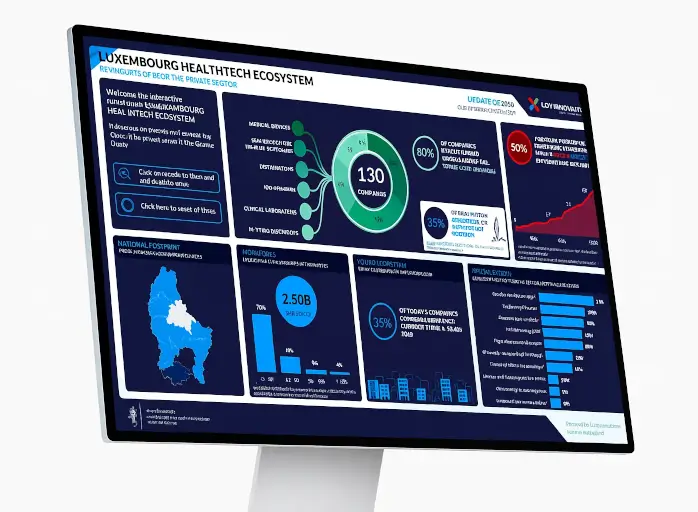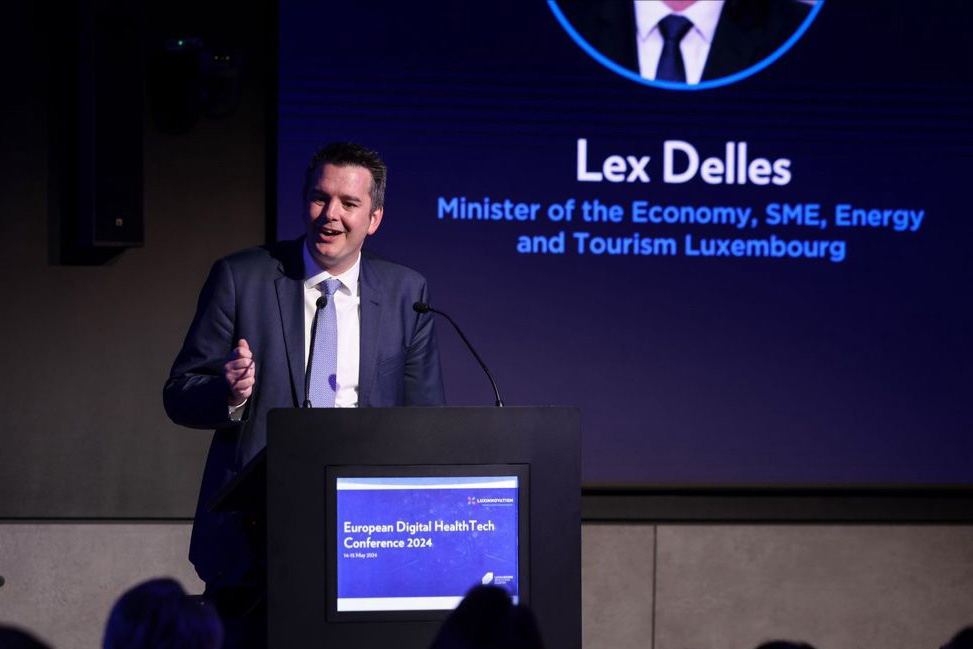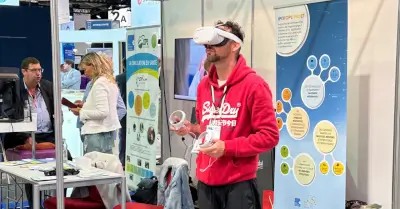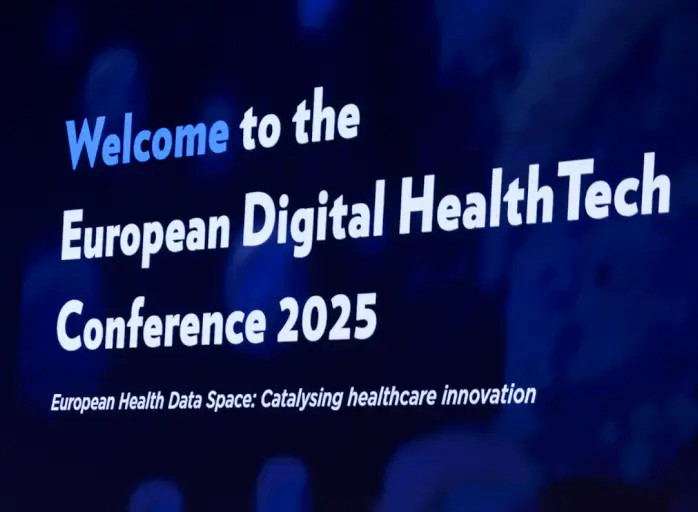

Taking digital health from innovation to market success
On 14-15 May 2024, the second edition of the European Digital Healthtech Conference focused on how to simplify EU market access for digital health solutions.
 Lena Mårtensson
Lena Mårtensson
15/05/2024
 Digital health solutions have the potential to completely transform many aspects of healthcare and generate value for patients, healthcare providers and society. However, turning great innovations into successfully commercialised products remains a challenge. The European Digital Healthtech Conference, organised by Luxinnovation, Medical Valley, EIT Health, and DMAC, brought together around 400 participants in Luxembourg to share best practices on how European, national and regional entities can optimise their support for digital health companies.
Digital health solutions have the potential to completely transform many aspects of healthcare and generate value for patients, healthcare providers and society. However, turning great innovations into successfully commercialised products remains a challenge. The European Digital Healthtech Conference, organised by Luxinnovation, Medical Valley, EIT Health, and DMAC, brought together around 400 participants in Luxembourg to share best practices on how European, national and regional entities can optimise their support for digital health companies.
“Digital medical devices can surely contribute to a better implementation of preventive and personalised medicine,” said Lex Delles, Luxembourg’s Minister of the Economy, SMEs, Energy and Tourism, in his opening speech. “This is why Luxembourg focuses on medical devices, in vitro diagnostics and, in particular, on digital health. Our purpose is that these digital health technologies benefit the health and well-being of the whole population.”Our purpose is that these digital health technologies benefit the health and well-being of the whole population.
Lex Delles, Luxembourg’s Minister of the Economy, SMEs, Energy and Tourism
Securing the access to data
The use of qualitative data is obviously at the heart of digital health. Data abounds, but accessing and using it is not always easy. Initiatives such as CLINNOVA, which involves research organisations in France, Germany, Luxembourg and Switzerland creating federated, standardised and interoperable medical data lakes to enable precision medicine, are addressing this issue, but common solutions at the European level are needed.This is where two key European initiatives come into play: the European Health Data Space (EHDS) regulation, which aims to enable the safe and secure exchange, use and reuse of health data to benefit patients, researchers, innovators and regulators, and the AI Act, the world’s first comprehensive artificial intelligence law which will ensure better conditions for the development and use of this innovative technology.
“The EHDS and the AI Act are enabling regulations used to create an environment conducive to innovation,” underlined Marco Marsella, Director for Digital, EU4Health and Health Systems Modernisation at the European Commission’s DG HEALTH. The EHDS will facilitate the exchange of data for the delivery of healthcare across the EU. It will also lay the foundation for building a consistent, trustworthy and efficient system for the secondary use of health data for research, innovation, policy-making and regulatory activities.The EHDS and the AI Act are enabling regulations used to create an environment conducive to innovation.
Marco Marsella, European Commission, DG HEALTH
“The EHDS regulation offers new perspectives for innovation,” emphasised Minister Delles. “Luxembourg aims to become a leading European hub in healthtech, for the development, evaluation and entry into the European market of digital health technologies. I am convinced of the potential of artificial intelligence to boost our economy, particularly in the area of health technologies. That is why we intend to support the rapid implementation of the AI Act, since it provides an effective framework for the use of artificial intelligence.”
Defining robust business models
A second key topic discussed at the European Digital Health Conference was the development of suitable business models for digital health companies. “There is no other sector like healthcare where you have to take into account patients, doctors, and the third party who actually pays,” said Marc Molitor, co-founder of the digital health platform Doctena. “Many startups that come to me for advice underline that they are creating value for society, but the most fundamental question to ask even before starting the journey is: at the end of the day, who will pay?” The digital health sector is still relatively young and interactions with social security systems across Europe and the world are at an early stage. “There aren’t a lot of already existing pathways that you can follow to commercial viability,” said Antoine Jomier, CEO and co-founder of Incepto Medical, which provides AI solutions for medical imaging. “My advice is to work very actively on the business model from the very beginning and identify who the first customer will be, what value you can bring, and who will provide the financing. You also need to define how you can move very quickly from a proof of concept to a product that you can sell.”
The digital health sector is still relatively young and interactions with social security systems across Europe and the world are at an early stage. “There aren’t a lot of already existing pathways that you can follow to commercial viability,” said Antoine Jomier, CEO and co-founder of Incepto Medical, which provides AI solutions for medical imaging. “My advice is to work very actively on the business model from the very beginning and identify who the first customer will be, what value you can bring, and who will provide the financing. You also need to define how you can move very quickly from a proof of concept to a product that you can sell.”
Zied Tayeb, founder and CEO of brain health monitoring and recovery software producer Myelin-H, underlined the importance of involving patients very early in the process. “If you plan to sell to pharma companies, try to get them involved as well even if they are not yet interested in buying,” he said. “I also recommend starting small and finding a niche market where you can get traction, and then expand. Luxembourg is a small market that is a suitable launch pad for testing things and trying them out.”The most fundamental question to ask even before starting the journey is: at the end of the day, who will pay?
Marc Molitor, Doctena
Understanding the needs of the market is equally important. “The European healthcare ecosystem has a volume approach, and you need to play the efficiency game. If you can offer a solution that enables doctors to save time, examine more patients, or have a reduced mental load, there is a real potential,” said Mr Jomier. “Work with opinion leaders in the market and try to move your new tool from a ‘nice to have’ to a ‘must have’. Once 20-30% of the doctors are using your solution, you have a very good basis for discussing with the social security reimbursement authorities.”
The patient at the centre
In her closing address, Martine Deprez, Luxembourg’s Minister of Health and Social Security, put the spotlight on the ultimate objective of all efforts in digital health. “Digitalisation brings data. Data brings knowledge. Knowledge brings innovation. But innovation brings responsibility,” she pointed out. “In whatever we do in digital health, this responsibility has a name: the patient.”Photo credits: Luxinnovation/Sophie Margue







